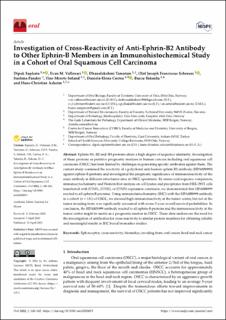| dc.contributor.author | Sapkota, Dipak | |
| dc.contributor.author | Vallenari, Evan Michael | |
| dc.contributor.author | Tamatam, Dhanalakshmi | |
| dc.contributor.author | Schreurs, Olaf Joseph Franciscus | |
| dc.contributor.author | Pandey, Sushma | |
| dc.contributor.author | Søland, Tine Merete | |
| dc.contributor.author | Costea, Daniela Elena | |
| dc.contributor.author | Tokozlu, Burcu | |
| dc.contributor.author | Åsheim, Hans-Christian | |
| dc.date.accessioned | 2023-02-23T09:29:59Z | |
| dc.date.available | 2023-02-23T09:29:59Z | |
| dc.date.created | 2022-10-27T11:14:26Z | |
| dc.date.issued | 2022 | |
| dc.identifier.citation | Oral 2022, 2, 148–162. | en_US |
| dc.identifier.issn | 2673-6373 | |
| dc.identifier.uri | https://hdl.handle.net/11250/3053511 | |
| dc.description.abstract | Ephrin-B1,-B2 and -B3 proteins share a high degree of sequence similarity. Investigation of these proteins as putative prognostic markers in human cancers including oral squamous cell carcinoma (OSCC) has been limited by challenges in generating specific antibodies against them. The current study examined the reactivity of a polyclonal anti-human ephrin-B2 antibody (HPA008999) against ephrin-B proteins and investigated the prognostic significance of immunoreactivity of the same antibody at different intra-tumor sites in OSCC specimens. By amino acid sequence comparison, immunocytochemistry and Western blot analysis on cell lysates and precipitates from HEK-293T cells transfected with EFNB1, EFNB2, or EFNB3 expression constructs, we demonstrated that HPA008999 reacted to all ephrin-B proteins. Using immunohistochemistry (IHC) with the HPA008999 antibody in a cohort (n = 131) of OSCC, we showed high immunoreactivity at the tumor center, but not at the tumor invading front, was significantly associated with worse 5-year overall survival probabilities. In conclusion, the HPA008999 antibody reacted to all ephrin-B proteins and the immunoreactivity at the tumor center might be useful as a prognostic marker in OSCC. These data underscore the need for the investigation of antibodies for cross-reactivity to similar protein members for obtaining reliable and meaningful results in IHC based biomarker studies. | en_US |
| dc.language.iso | eng | en_US |
| dc.rights | Navngivelse 4.0 Internasjonal | * |
| dc.rights.uri | http://creativecommons.org/licenses/by/4.0/deed.no | * |
| dc.subject | eph-receptor | en_US |
| dc.subject | cross-reactivity | en_US |
| dc.subject | biomarker | en_US |
| dc.subject | invading front | en_US |
| dc.subject | oral cancer | en_US |
| dc.subject | head and neck cancer | en_US |
| dc.subject | eph-reseptor | en_US |
| dc.subject | kryssreaktivitet | en_US |
| dc.subject | munnhulekreft | en_US |
| dc.subject | biomarkør | en_US |
| dc.subject | hode- og halskreft | en_US |
| dc.title | Investigation of Cross-Reactivity of Anti-Ephrin-B2 Antibody to Other Ephrin-B Members in an Immunohistochemical Study in a Cohort of Oral Squamous Cell Carcinoma | en_US |
| dc.title.alternative | Investigation of Cross-Reactivity of Anti-Ephrin-B2 Antibody to Other Ephrin-B Members in an Immunohistochemical Study in a Cohort of Oral Squamous Cell Carcinoma | en_US |
| dc.type | Peer reviewed | en_US |
| dc.type | Journal article | en_US |
| dc.description.version | publishedVersion | en_US |
| dc.source.volume | 2 | en_US |
| dc.source.journal | Oral | en_US |
| dc.identifier.doi | https://doi.org/10.3390/oral2020015 | |
| dc.identifier.cristin | 2065557 | |
| cristin.ispublished | true | |
| cristin.fulltext | original | |

